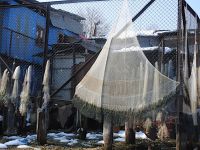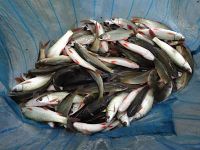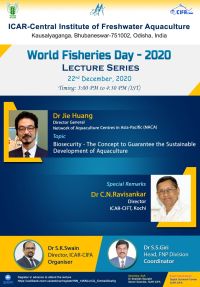Kashmir Valley is bestowed with abundant water resources in the form of high altitude lakes, wetlands, rivers and springs and the geophysical conditions offer a great scope for fish to thrive. Around 15% of the population has fisheries as a principal source of income. In Kashmir, the dominant active fishing gear is the cast net, known locally as zaal, and cast nets are heavily used in the Dal, Wular, and Manasbal lakes of the valley. This article describes typical designs of cast nets used in the valley.
The ‘Moyna Model’ is accepted as an example for freshwater fish culture throughout West Bengal. Moyna is a great example of the freshwater fish culture revolution in West Bengal and a new horizon for culture of the major carps. Moyna fish farmers have adapted the procedures of Andhra farmers incorporating their own blend of experience, skill and technology. This article describes the history and development of major carp culture practices in Moyna, challenges faced by the industry including groundwater exploitation, and documents the experience of some progressive farmers.
NACA's Director General Dr Jie Huang will give a virtual lecture on "Biosecurity - the concept to guarantee the sustainable development of aquaculture" as part of the World Fisheries Day 2020 Lecture Series, hosted by the ICAR-Central Institute of Freshwater Aquaculture, India. The lecture will be presented on 22 December from 3pm - 4:30pm India Standard Time (UTC +5:30) via Zoom. The lecture will feature Special Remarks by Dr C.N. Ravisankar, Director of ICAR-CIFT. The Organiser is Dr S.K. Swain, Director of ICAR-CIFA, and the Coordinator is Dr S.S. Giri, Head, FNP Division. Attendance is open to all, please register.
As a follow on from the first course, the Second Online Training Program of Mariculture Technology for the Asia-Pacific Region will be held from 15 to 20 December 2020 via Zoom. The course will focus on aquaculture biosecurity and related technologies at the international, national, and on-farm levels. Lectures will be given by experts from FAO, OIE, NACA, YSFRI, and industry. Participation is free but pre-registration is required.
A free webinar on aquaculture in silk road countries will be held from 24-25 November, from 10:00 to 17:00 Beijing time (UTC +8). The theme of the forum is Sustainable Aquaculture Development: Response Strategies Towards Post-pandemic. Participation is free for all but registration is required. The webinar will be held via Zoom.


